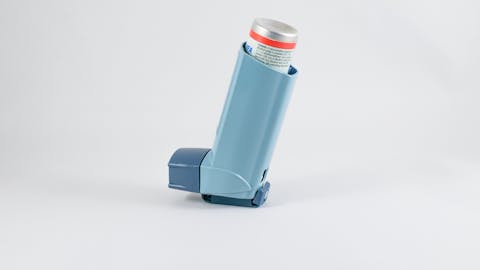Unidentified Analyst: Okay. Thank you.
Operator: And our next question comes from Eric Coldwell with Baird. Please state your question.
Eric Coldwell: Thank you, and good morning. I wanted to ask two questions. The first is on Philips and their decision to stop selling equipment in the U.S. Just what kind of knock-on effects have you seen? And is there any lingering impact of their recalls and their regulatory issues and now their decision to extricate themselves from the U.S. marketplace. Thank you.
Todd Zehnder: Yes. I’ll take it. I’ll split it up into two products because it really affects PAPs and vents more than items. On the PAPs side, it really got an impact us outside of the fact that in the event that we have patients that are on a Philips product, they might want a different product. I don’t think- we’re not seeing that in any large scale or really any scale for that matter. So it shouldn’t impact the sleep business anymore. It did in the past when we had to get all of those patients set up on new equipment, be it either a new Philips device that was FDA compliant or some of our other vendors. This has been going on for a few years now. And so the good news is we have adequate sleep providers or other manufacturers who are able to fulfill all of our needs at this point.
So no issues there. As it relates to the events, the recall is still in place, and I know that Philips and the FDA are working on a remediation. It’s very minor, in our opinion, a very minor remediation but one that has taken a long time to get done. The ability for us to continue to service patients with those ventilators remains, and we are still servicing patients and have been reworking devices. So the ability for us to continue with that is not at risk in our opinion. At some point, they won’t be in the market of making parts down the road and so forth, but we are planning effectively for that. I think the best thing though, Eric, is that it’s been going on for three years, and we diversified our fleet at this point. And there are three other very competent vent manufacturers out there, and we’re probably up to roughly 50% of our fleet being non-Philips at this point and only getting larger every month.
Eric Coldwell: Perfect. Second topic, you alluded to this in the prepared remarks. I’ve been focused on it. The CMS final rules are actually, I think, a set of three of them in total, one that went live in January, one that goes live and another one that goes live in 2026. But in general, we’re seeing CMS really rein in these Medicare Advantage and managed Medicaid plans for things like improper denials unnecessary and improper prior authorizations. Also CMS forcing these plans to fully cover everything that’s covered under fee-for-service, which was not always the case in the past, providing faster appeals, resolution transparency. A lot of good things for the DME industry. I believe I’m curious, you mentioned it could be a good guy.
I’m just curious, do you have any statistics or analysis that might suggest how these tighter rules around the MCOs could actually quantitatively impact you? Is that something that is available? And have you seen any impact at this point given the last rule went into effect a couple of months ago?
Casey Hoyt: Yes. I mean we’ve seen a little bit of a behavior shift. Everything I have is really anecdotal in terms of stories and approvals. I don’t have a number right here in front of me, but I can circle back with you, Eric, what we’re seeing. I predict that the behavior is going to change here with all these final rules now in place. And it’s not material at this moment in time, but check back in Q2, and we might have some metrics there that hopefully we see some metrics that are side of life for improvement on authorizations and they’re following Medicare guidelines, which is all they really need to do. So.
Eric Coldwell: Oh, go ahead, please. Sorry.
Casey Hoyt: No, no, we’re just optimistic about what’s going to happen.
Eric Coldwell: Yes, it can’t hurt. I think it’s the way we look at it. Last one, just maybe a bit of a reach and a derivative of something that’s happening nationally with this Change Healthcare cyber-attack. Have you seen any have you seen any impact in the last 2-plus weeks regarding this in terms of any form of patient challenge or customer behavior shift in the marketplace. It’s getting a lot of headlines. I think most of our companies are saying it’s probably not going to be a material knock-on effect, but I am curious if you’ve seen any ripple effect from the challenges that United is having with Change Healthcare and then therefore, a number of providers are having challenges as well.
Todd Zehnder: Yes, I’ll take that. I mean, the beginning part of your question is the part that we can definitively say we’re thankful nothing has happened. Patient care has not been compromised at all. And so that’s the most important thing. I know- two weekends ago, the pharmaceutical benefits were some issues, and I think that was the first thing they tackled. So they got that stood up and things are good. So we can definitively say we’ve been able to take care of patients and continue to get authorizations in a timely manner. What will happen is the submission of claims is getting slowed down. We- anything that’s going through change has been halted for about the last 10 days. We have proactively worked to get through two phases to go ahead and reroute some of our largest carriers to other clearing houses so that we can keep the- really the cash flow coming in.
It’s really a delay more than anything. But yes, it’s a disruption to the industry for sure. We applaud and support their efforts to make sure that it’s secure going forward because we take security very seriously around here. So they need to do the right thing. I know they are, in the interim, we are taking the time to go ahead and just reroute payers to make sure we’re not negatively impacted from a cash standpoint.



